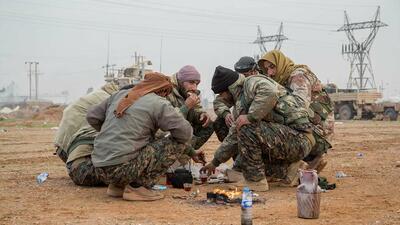
| Published June 3, 2025
The Islamic State group, also known as ISIS, has claimed its first attack on the new Syrian government’s forces since longtime president Bashar al Assad was ousted, according to a war monitoring body.
A new wave of violence is sweeping across northeastern Syria as the Islamic State (ISIS) has claimed responsibility for a series of deadly attacks targeting Kurdish-led forces and, more notably, Syria’s newly formed central government. This marks the group’s first coordinated offensive since the fall of longtime President Bashar al-Assad in December 2024, signaling a troubling revival of extremist activity during a period of national vulnerability.
According to reports, ISIS militants launched surprise ambushes and IED attacks near Deir ez-Zor and Raqqa, targeting outposts loyal to the new government led by President Ahmad al-Sharaa. The UK-based Syrian Observatory for Human Rights confirmed casualties among security personnel and described the attacks as “well-coordinated,” suggesting the group has re-established sleeper cells and logistical capacity.
While ISIS has maintained low-level insurgent activity in rural Syria and Iraq over the past few years, this recent escalation is significant for both its timing and its targets. Until now, ISIS had largely focused on hitting Kurdish-led Syrian Democratic Forces (SDF) or isolated checkpoints. But this week’s strikes represent a direct challenge to Syria’s post-Assad central authority—an authority that is still struggling to assert itself amid economic collapse, fractured military command, and contested legitimacy.
It is reported that the attacks coincide with growing discontent among tribal communities and militias who once opposed Assad but now feel excluded from the post-war power structure. ISIS may be capitalizing on these local grievances, portraying itself not only as a jihadist movement but also as a populist insurgency against foreign-backed or weak leadership.
Security analysts have warned for months that the collapse of Assad’s regime, while seen by many as a necessary step toward peace, could open a dangerous power vacuum. With international actors—such as Russia, Iran, the U.S., and Turkey—still competing for influence, the lack of unified governance and security fragmentation in eastern Syria provides a fertile environment for ISIS to regroup.
The attacks also raise questions about the capabilities of the new Syrian military and whether it can withstand a prolonged insurgency without substantial foreign aid or restructuring. Meanwhile, Kurdish forces in the north remain a primary target, but they are also stretched thin due to border tensions with Turkey and decreasing Western support.
As of now, there has been no official response from President al-Sharaa, but local sources say a counterterrorism task force is being mobilized to reinforce volatile zones in Raqqa and Hasakah provinces.
Meanwhile, HTS itself is not much removed from ISIS…
The current Syrian government are mix Isis with Al Qaeda (Bin Laden soldiers) that declared war on the west many times before they took over
But now they will deceive the west and play moderate to lift sanctions and get funding to build themselves and prepare for offensive pic.twitter.com/9AtDH5qrp3
— Bob (@Shariakill) February 23, 2025
ISIS said the first attack was in Suwayda Governorate, and that it killed or wounded seven soldiers. The second attack was near the first one but a week later, and targeted the US-backed Free Syrian Army (FSA), killing one and wounding three.
Here are the key implications of ISIS launching its first attacks on Syria’s new government since the fall of Bashar al-Assad:
⚠️ 1. Resurgence of ISIS
Exploiting the Power Vacuum: The fall of Assad has created a transitional period ripe for exploitation. ISIS is seizing this moment of instability to reassert itself, rebuild networks, and carry out targeted attacks.
Shift in Strategy: The attacks suggest a tactical shift—from insurgency against Kurdish and U.S.-backed forces to targeting Syria’s new central authority, aiming to destabilize the post-Assad order.
—
🛡️ 2. Threat to Regional Security
Kurdish Vulnerability: ISIS attacks in northeastern Syria signal renewed threats to Kurdish-led SDF forces, which have long been a frontline defense against ISIS but may now be overstretched or politically marginalized.
Ripple Effect: A renewed ISIS threat in Syria could spill over into Iraq, Turkey, and Lebanon, reigniting regional instability and terrorism risks.
—
🏛️ 3. Fragility of Syria’s New Government
Legitimacy Crisis: Early attacks challenge the credibility and control of President Ahmad al-Sharaa’s administration, especially if it cannot quickly restore order and suppress terrorist threats.
Need for Coalition Support: The new government may require external support—military, intelligence, or diplomatic—to prevent ISIS from growing during this vulnerable transitional phase.
—
🌍 4. Global Terrorism Warning
Potential for Global Echoes: A resurgent ISIS presence in Syria could inspire attacks abroad, as has happened in the past, especially if propaganda networks regain strength.
Refocus for Western Powers: The U.S. and its allies may need to re-evaluate their counterterrorism posture in the region, possibly delaying disengagement or drawing renewed attention to Middle East security.
🧭 Overall Takeaway:
The recent ISIS attacks on Syria’s new post-Assad government are a wake-up call: while the Assad regime has fallen, peace and stability remain elusive.
ISIS is using the transitional chaos to reassert itself, exposing the fragility of the new leadership and underscoring the ongoing threat of extremist resurgence in the region. This marks not only a test for Syria’s internal security, but also a potential flashpoint for renewed regional and global terrorism concerns.
Bottom line:
The fall of a dictator doesn’t guarantee peace—without strong institutions, security, and unity, it can invite old threats back to the battlefield.
SOURCES: ZEROHEDGE – Resurgent ISIS? Terror Cells Launch Deadly Attacks On Syria’s Kurds
AL JAZEERA – ISIL (ISIS) launches first attacks against new Syrian government
THE TIMES OF ISRAEL – ISIS claims first attack on Syrian government forces since Assad’s fall
SKY NEWS – Islamic State group claims first attack on new Syrian government’s forces since fall of Assad regime, says monitor





Be the first to comment